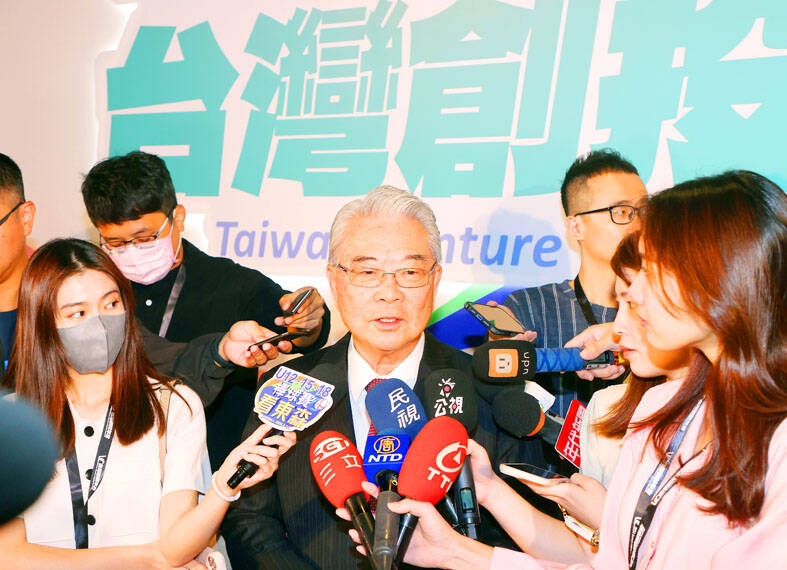Rock Hsu (許勝雄), founder and president of local electronics conglomerate Kinpo Group (金寶集團), yesterday urged the government to protect Taiwan’s semiconductor industry during its negotiations with the US.
Speaking with reporters on the sidelines of the Taiwan Venture Capital Summit in Taipei, Hsu said that the semiconductor industry needs protection, as it has played a critical role in Taiwan’s economic development.
The government should balance seeking lower tariffs from the US and other economic benefits by not making too many concessions during negotiations with Washington that would hurt Taiwan’s global competitiveness, he said.

Photo: CNA
It was understandable that Taiwan would have to pay a price to get a lower tariff, but the negotiating team should know how to protect the country’s interests, he added.
In the first seven months of this year, semiconductors accounted for 32.3 percent of Taiwan’s total outbound sales with a value of US$109.78 billion, up 23.5 percent from a year earlier, Ministry of Finance data showed.
On Monday, Vice Premier Cheng Li-chiun (鄭麗君), who led a Taiwanese delegation to the talks with the US, said that the government would continue the negotiations to bring down a blanket tariff, currently set at 20 percent.
Hsu said that many Taiwanese firms are either investing or planning to invest in the US market, where they face challenges such as high production costs and a wide cultural gap.
The US has to be aware that it is not easy to duplicate Taiwan’s 24-hour-a-day work culture, he said.
Old economy industries, such as the machinery and textile industries, also need protection, he said, adding that the government should cap the New Taiwan dollar’s appreciation to mitigate the impact of US tariffs.
The Taipei-based Chinese National Federation of Industries (全國工業總會) said that the government should freeze an electricity rate hike scheduled for September and postpone carbon fee collections, which are scheduled to start next year, to ease the business sector’s financial burden.
The government should allow the NT dollar to depreciate by at least 10 percent to raise exporters’ competitive edge, the federation said.
In addition to the 20 percent tariff, the levy has been added to pre-existing most-favored-nation duties and industry-specific trade remedy tariffs from Thursday last week.
The government’s negotiating team has vowed to seek a tariff stacking relief during talks with the US.

NO BREAKTHROUGH? More substantial ‘deliverables,’ such as tariff reductions, would likely be saved for a meeting between Trump and Xi later this year, a trade expert said China launched two probes targeting the US semiconductor sector on Saturday ahead of talks between the two nations in Spain this week on trade, national security and the ownership of social media platform TikTok. China’s Ministry of Commerce announced an anti-dumping investigation into certain analog integrated circuits (ICs) imported from the US. The investigation is to target some commodity interface ICs and gate driver ICs, which are commonly made by US companies such as Texas Instruments Inc and ON Semiconductor Corp. The ministry also announced an anti-discrimination probe into US measures against China’s chip sector. US measures such as export curbs and tariffs

The US on Friday penalized two Chinese firms that acquired US chipmaking equipment for China’s top chipmaker, Semiconductor Manufacturing International Corp (SMIC, 中芯國際), including them among 32 entities that were added to the US Department of Commerce’s restricted trade list, a US government posting showed. Twenty-three of the 32 are in China. GMC Semiconductor Technology (Wuxi) Co (吉姆西半導體科技) and Jicun Semiconductor Technology (Shanghai) Co (吉存半導體科技) were placed on the list, formally known as the Entity List, for acquiring equipment for SMIC Northern Integrated Circuit Manufacturing (Beijing) Corp (中芯北方積體電路) and Semiconductor Manufacturing International (Beijing) Corp (中芯北京), the US Federal Register posting said. The

India’s ban of online money-based games could drive addicts to unregulated apps and offshore platforms that pose new financial and social risks, fantasy-sports gaming experts say. Indian Prime Minister Narendra Modi’s government banned real-money online games late last month, citing financial losses and addiction, leading to a shutdown of many apps offering paid fantasy cricket, rummy and poker games. “Many will move to offshore platforms, because of the addictive nature — they will find alternate means to get that dopamine hit,” said Viren Hemrajani, a Mumbai-based fantasy cricket analyst. “It [also] leads to fraud and scams, because everything is now

MORTGAGE WORRIES: About 34% of respondents to a survey said they would approach multiple lenders to pay for a home, while 29.2% said they would ask family for help New housing projects in Taiwan’s six special municipalities, as well as Hsinchu city and county, are projected to total NT$710.65 billion (US$23.61 billion) in the upcoming fall sales season, a record 30 percent decrease from a year earlier, as tighter mortgage rules prompt developers to pull back, property listing platform 591.com (591新建案) said yesterday. The number of projects has also fallen to 312, a more than 20 percent decrease year-on-year, underscoring weakening sentiment and momentum amid lingering policy and financing headwinds. New Taipei City and Taoyuan bucked the downturn in project value, while Taipei, Hsinchu city and county, Taichung, Tainan and Kaohsiung